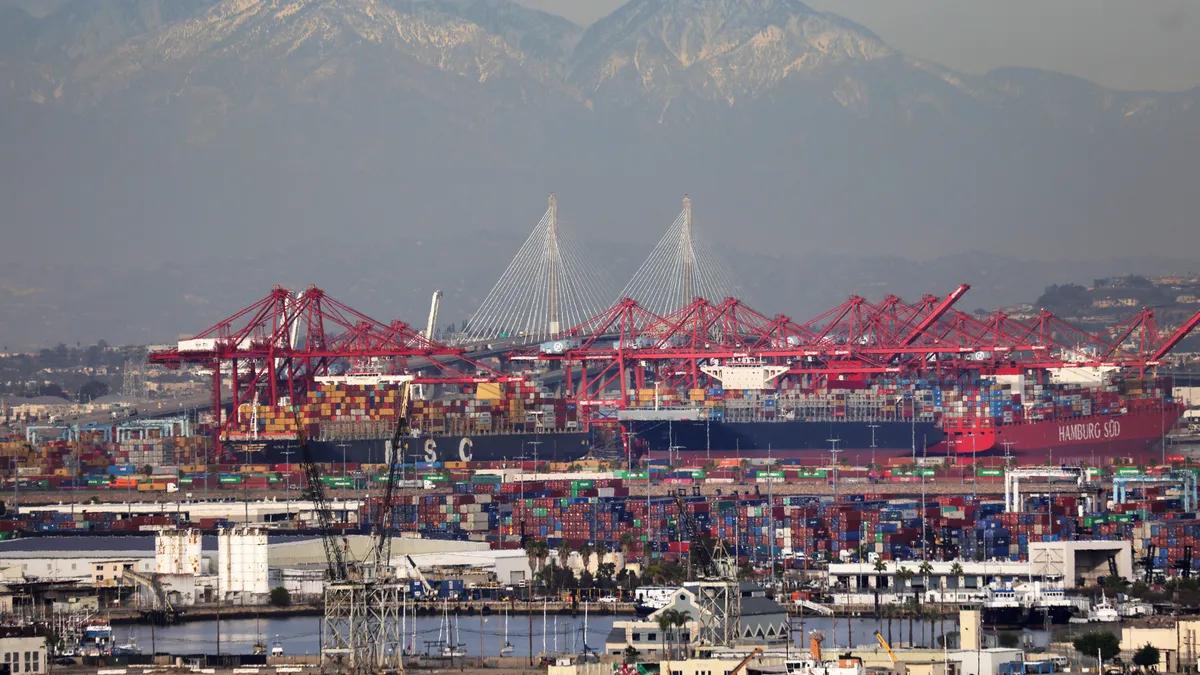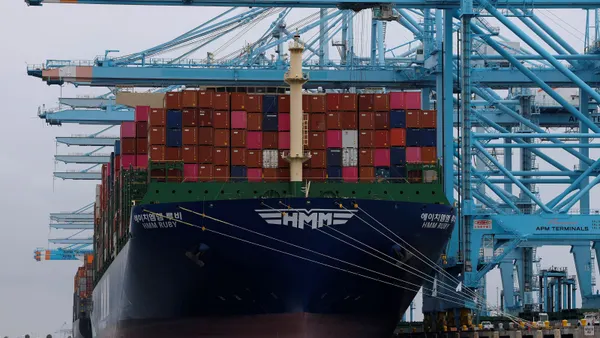UPDATE: Sept. 10, 2021: On Thursday, the FMC revealed the 24 members of the National Shipping Advisory Committee. Members include Target, Amazon, Tyson Foods and Blue Diamond Growers. They will serve until Dec. 31, 2024.
FMC Chairman Daniel B. Maffei said in a statement the commissioners need rapid access to the perspective of importers and exporters on the ground dealing with the realities of ocean shipping everyday. He said, "We also need them to meet and help guide our efforts and those outside the FMC to improve the system and make it easier, fairer, and more efficient to American shippers."
The Federal Maritime Commission plans to stand up and fill a Shipper Advisory Committee within "the next couple of months," Chairman Daniel B. Maffei told Supply Chain Dive Thursday.
The committee will have 24 seats with half going to exporters and half to importers. The FMC will consider the committee's advice, when it comes to figuring out what steps the agency can take to help exporters obtain containers, as some have noted the difficulty of getting access to equipment.
The goal of the committee is to advise the agency on the "competitiveness, reliability, integrity, and fairness of the international ocean freight delivery system," according to legislation introduced by Congress.
The committee stems from a recommendation FMC Commissioner Rebecca Dye issued in 2018, after the agency completed an investigation into supply chain bottlenecks. And Congress took up legislation that would create such a committee last year. Language for the advisory committee was included in the National Defense Authorization Act for 2021, which passed in January.
The FMC plans to hear from the shipper committee before the end of the year.
"I'm hoping to have their advice by the fall," Maffei said.
The agency plans to discuss the committee at an upcoming open meeting, where more details will be shared on its creation and role, Maffei said. A spokesperson said the agency plans to hold the meeting May 19.
Regulation in a turbulent supply chain environment
The idea for the committee came prior to the pandemic, but the supply chain effects that have unraveled over the last year created what Maffei referred to as a "systematic crisis."
"What we're really talking about is a lack of capacity of the system in the United States — the ocean freight system, but more than that, the whole supply chain — to handle this level of cargo," he said.
Multiple months of record-setting imports at ports across the country have clogged container gateways, spiked the price for ocean shipping and led to accusations that ocean carriers are prioritizing Asian exporters over U.S. exporters.
"What we're really talking about is a lack of capacity of the system in the United States ... to handle this level of cargo."

Daniel B. Maffei
Chairman of the Federal Maritime Commission
The level of disruption has led to calls from export groups and supply chain organizations, asking the FMC to do something to help lessen the turbulence.
Maffei, a former congressman who also spent time working for the Department of Commerce during the Obama Administration, serves as FMC chairman in this turbulent environment. He succeeds Michael Khouri, who was chairman from March 2019 to March 2021.
In a statement following the announcement of Maffei's appointment to the chairman role by President Joe Biden's administration, Maffei acknowledged some policy differences between Khouri and himself. In an interview, he underscored that the two "agree on far more than we disagree on."
The differences come down to how the two interpret the Shipping Act, specifically that Khouri thinks violations of the Shipping Act require a pattern of wrongdoing, Maffei said.
"My sense is that he's got some good points," he said. "But ... if there's a single instance of wrongdoing, often it indicates a pattern," adding that it would be a burden on the complainant to prove a pattern.
Another important difference is driven in part by Maffei's background as a legislator.
"I'm going to be a lot more involved, obviously, in whether or not we should do new legislation; what would be in new legislation if we did it; what would be the downsides or the potential side effects of doing certain kinds of things with the Shipping Act," he said.
Maffei has said before that Congress could play an important role in updating the Shipping Act, saying in December, as the FMC looks into exports issues, "it may be something that Congress may act on."
He said last week the maritime industry has changed significantly since the Shipping Act was passed in 1984.
"Ship capacity has tripled since then," he said. "We've gone from about 20 [to] 22 major carriers to just nine, depending on how you define it, three alliances. And [back] then, there were U.S.-based carriers; now, all the carriers are ultimately based in some other countries. So, that's quite a bit of difference."
He said he supports Congress making tweaks to modernize the Shipping Act. But it should not just be in response to the current crisis of demand overwhelming supply, but rather changes based on how the industry has shifted in the last two decades, he said.
"I'm going to be a lot more involved, obviously, in whether or not we should do new legislation."

Daniel B. Maffei
Chairman of the Federal Maritime Commission
Maffei and Commissioner Rebecca Dye met with Congressional leadership to discuss issues in the ocean shipping industry last month.
The agency has also been investigating the pandemic's effect on the ocean shipping industry through Fact Finding 29, led by Dye. Part of that mission looks into carriers' detention and demurrage practices. Dye has spoken in recent months about taking steps around enforcement of the agency's rules in this area.
Information from multiple stakeholders was due at the beginning of the month, and the agency staff has started "sifting through tons and tons of data and other kinds of potential evidence," Maffei said.
He said he does believe some abuses are taking place with regards to following the agency's detention and demurrage rules.
"I can't predict," he said, "but I can say I hope there will be enforcement action."













